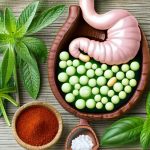Gas and bloating are incredibly common digestive complaints, affecting a vast majority of people at some point in their lives. These uncomfortable symptoms can range from mild annoyance to significantly disruptive discomfort, impacting daily activities and overall well-being. Often stemming from dietary choices, rapid eating, stress, or underlying gut imbalances, the root causes are diverse and complex. While many over-the-counter remedies offer temporary relief, a growing body of research points to the potential benefits of probiotics – live microorganisms that, when ingested in adequate amounts, confer a health benefit on the host. Specifically, certain probiotic strains demonstrate remarkable ability to alleviate gas and bloating by modulating gut flora, improving digestion, and reducing inflammation. Understanding which strains are most effective, and how they work, can empower individuals to proactively manage these distressing symptoms and promote long-term digestive health. For those seeking alternative remedies, exploring natural remedies for gas and bloating might also be beneficial.
The intricate ecosystem within our gut – the gut microbiome – plays a pivotal role in overall health. When this delicate balance is disrupted (dysbiosis), it can lead to various digestive issues, including excessive gas production and bloating. Fermentation of undigested carbohydrates by certain bacteria produces gases like hydrogen, carbon dioxide, and methane, leading to discomfort. Probiotics aren’t a one-size-fits-all solution; different strains have different mechanisms of action and varying degrees of effectiveness for specific conditions. Therefore, selecting the right probiotic strain is crucial for targeted relief from gas and bloating. This article will delve into some of the most promising strains currently researched for their ability to manage these symptoms, exploring how they work and what evidence supports their use. A deeper dive into probiotics in managing bloating and gas can reveal more about the science behind them.
Probiotic Mechanisms for Gas & Bloating Reduction
Probiotics tackle gas and bloating through a multifaceted approach that goes beyond simply “adding good bacteria.” They influence digestive processes in several key ways. Firstly, some strains produce enzymes like beta-galactosidase which helps break down lactose, preventing fermentation by gut bacteria in those with lactose intolerance. Others enhance intestinal motility, reducing the time food remains in the colon – less time means less gas production. Importantly, certain probiotics can directly compete with gas-producing bacteria for resources and adhesion sites within the gut, effectively limiting their growth and activity.
Beyond enzymatic digestion and competition, probiotics also bolster the gut barrier function. A compromised gut barrier (often referred to as “leaky gut”) allows undigested food particles and toxins to enter the bloodstream, triggering inflammation and exacerbating digestive symptoms. Probiotics help strengthen this barrier by promoting the production of mucin – a protective layer that lines the intestinal walls – and tight junction proteins which seal spaces between intestinal cells. This improved barrier function reduces systemic inflammation, contributing to overall gut health and reduced bloating.
Finally, many beneficial probiotic strains influence the nervous system via the gut-brain axis. This bidirectional communication pathway means the gut impacts brain function and vice versa. By modulating neurotransmitter production and reducing stress hormones, probiotics can help alleviate some of the psychological factors that contribute to digestive discomfort – such as anxiety which can worsen bloating. It’s a complex interplay demonstrating how gut health is intimately connected to overall well-being. Adjusting your diet alongside combining probiotics and diet changes can amplify these benefits.
Specific Probiotic Strains & Evidence
Several probiotic strains have shown promise in clinical studies for reducing gas and bloating. Bifidobacterium infantis 35624 is arguably the most extensively researched, particularly for Irritable Bowel Syndrome (IBS) symptoms including bloating and gas. Studies demonstrate this strain can significantly reduce abdominal distension and flatulence compared to placebo, likely due to its ability to modulate gut microbiota composition and reduce inflammation. Lactobacillus plantarum 299v is another well-studied option, shown to alleviate bloating, gas, and abdominal pain in individuals with IBS. This strain appears to enhance intestinal barrier function and influence the production of short-chain fatty acids (SCFAs) – compounds beneficial for gut health.
Another promising contender is Lactobacillus reuteri. Some strains, like DSM 17938, have been shown to reduce bloating and flatulence in patients with chronic constipation and IBS. Saccharomyces boulardii, a probiotic yeast rather than bacterium, also demonstrates efficacy. It’s particularly helpful in preventing antibiotic-associated diarrhea, which often leads to dysbiosis and subsequent gas/bloating issues. Importantly, it’s crucial to remember that results can vary depending on the individual, the specific product formulation (CFU count, viability), and other factors like diet and lifestyle. For chronic indigestion, consider investigating best probiotic strains for managing chronic indigestion.
Identifying Underlying Causes & Personalized Approach
Before reaching for a probiotic, identifying potential underlying causes of your gas and bloating is essential. – Consider keeping a food diary to identify trigger foods – common culprits include beans, lentils, broccoli, cabbage, onions, garlic, apples, pears, and dairy (for those with lactose intolerance). – Evaluate your eating habits: are you eating too quickly? Swallowing excess air? – Assess stress levels: chronic stress can significantly impact digestion. – Rule out any underlying medical conditions such as celiac disease, food allergies/intolerances or small intestinal bacterial overgrowth (SIBO) through consultation with a healthcare professional. Understanding low-FODMAP food ideas can also help pinpoint dietary triggers.
The “best” probiotic strain isn’t universal; it’s highly personalized. What works for one person may not work for another. Consider your specific symptoms and potential underlying causes when selecting a probiotic. For example, if lactose intolerance is suspected, a probiotic containing beta-galactosidase producing strains might be most beneficial. If you’ve recently taken antibiotics, Saccharomyces boulardii could help restore gut flora balance. It’s often recommended to start with a low dose and gradually increase it to assess tolerance and minimize potential side effects like temporary gas or bloating which can occur as the gut microbiome adjusts.
Considerations for Probiotic Supplementation
Choosing a high-quality probiotic supplement is paramount. – Look for products from reputable brands that list specific strains on the label, rather than just “probiotic blend.” – Check the CFU (colony forming units) count – higher isn’t always better, but ensure it’s within the range supported by research for the strain you choose. – Consider whether the probiotic contains prebiotics – non-digestible fibers that feed beneficial bacteria and enhance their growth. However, some individuals may experience increased gas with prebiotic supplementation. – Ensure the product is properly stored according to manufacturer instructions (some require refrigeration).
Timing of probiotic consumption can also play a role. Some research suggests taking probiotics with or shortly after meals may improve survival rates as stomach acid is partially neutralized by food. However, this isn’t universally agreed upon and depends on the specific strain and product formulation. Finally, remember that probiotics are most effective when combined with a healthy diet rich in fiber, fruits, vegetables, and fermented foods – naturally occurring sources of beneficial bacteria. Planning ahead with food prep tips can support a gut-friendly diet.
Long-Term Gut Health & Lifestyle Factors
Probiotic supplementation is often a valuable tool for managing gas and bloating, but it’s just one piece of the puzzle. Cultivating long-term gut health requires a holistic approach incorporating lifestyle factors. – Prioritize a diverse diet rich in fiber from fruits, vegetables, whole grains, and legumes. Fiber feeds beneficial bacteria and promotes regularity. – Manage stress through techniques like meditation, yoga, or deep breathing exercises. Chronic stress negatively impacts digestion. – Get regular exercise – physical activity improves gut motility and reduces inflammation. – Stay hydrated by drinking plenty of water throughout the day. – Limit processed foods, sugary drinks, and excessive alcohol consumption. These can disrupt the gut microbiome.
Consider incorporating fermented foods like yogurt (with live cultures), kefir, sauerkraut, kimchi, and kombucha into your diet. These provide natural sources of probiotics. Finally, be mindful of potential food sensitivities or intolerances and consider an elimination diet to identify trigger foods if necessary. Utilizing herbal treatments like ginger, peppermint, and chamomile can also provide relief. By adopting these lifestyle changes alongside targeted probiotic supplementation, you can significantly improve your gut health and reduce the frequency and severity of gas and bloating, leading to a more comfortable and enjoyable life.


















